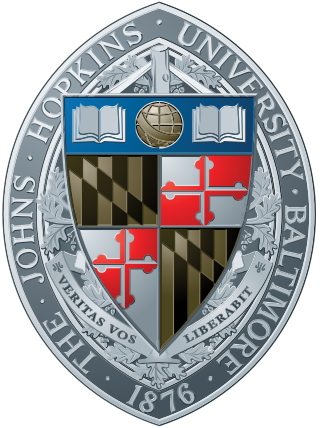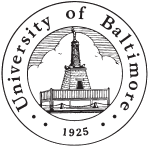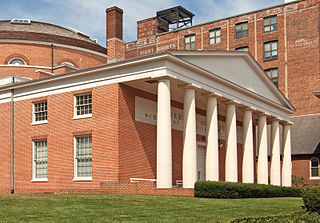
Johns Hopkins University is a private research university in Baltimore, Maryland, United States. Founded in 1876, Johns Hopkins was the first American university based on the European research institution model. The university also has graduate campuses in Italy, China, and Washington, D.C. It is considered to be the first research university in the U.S. and has been the national leader in annual research and development spending since the late 20th century.

Morgan State University is a public historically black research university in Baltimore, Maryland. It is the largest of Maryland's historically black colleges and universities (HBCUs). In 1890, the university, then known as the Centenary Biblical Institute, changed its name to honor Lyttleton Morgan, the first chairman of its board of trustees and a donor. It became a university in 1975.
Baltimore City Community College (BCCC) is a public community college in Baltimore, Maryland. It is the only community college in the city and the only state-sponsored community college in the state. It is accredited by the Middle States Commission on Higher Education (MSCHE). It was founded in 1947 and has about 5,000 students enrolled in one of its campuses.

Daniel Coit Gilman was an American educator and academic. Gilman was instrumental in founding the Sheffield Scientific School at Yale College, and subsequently served as the second president of the University of California, Berkeley, as the first president of Johns Hopkins University, and as founding president of the Carnegie Institution.

Bowie State University is a public historically black university in Prince George's County, Maryland, north of Bowie. It is part of the University System of Maryland. Founded in 1865, Bowie State is Maryland's oldest historically black university and one of the ten oldest in the country. Bowie State is a member-school of the Thurgood Marshall College Fund.

The University of Baltimore is a public university in Baltimore, Maryland. It is part of the University System of Maryland. UBalt's schools and colleges provide education in business, law, public affairs, and the applied arts and sciences. The university is the location of one of Maryland's two law schools.

The University of Maryland, Baltimore (UMB) is a public university in Baltimore, Maryland. Founded in 1807, it is the second oldest college in Maryland and comprises some of the oldest professional schools of dentistry, law, medicine, pharmacy, social work and nursing in the United States. It is the original campus of the University System of Maryland and has a strategic partnership with the University of Maryland, College Park. Located on 71 acres (0.29 km2) on the west side of downtown Baltimore, it is part of the University System of Maryland.

Notre Dame of Maryland University is a private Catholic university in Baltimore, Maryland. NDMU offers certificate, undergraduate, and graduate programs for women and men.

The Johns Hopkins Bloomberg School of Public Health is the public health graduate school of Johns Hopkins University, a private research university primarily based in Baltimore, Maryland.
Julian Cecil Stanley was an American psychologist. He was an advocate of accelerated education for academically gifted children. He founded the Johns Hopkins University Center for Talented Youth (CTY), as well as a related research project, the Study of Mathematically Precocious Youth (SMPY), whose work has, since 1980, been supplemented by the Julian C. Stanley Study of Exceptional Talent (SET), which provides academic assistance to gifted children. Stanley was also widely known for his classic book, coauthored with Donald Campbell, on the design of educational and psychological research - Experimental and Quasi-experimental Designs for Research.

Roland Park Country School (RPCS) is an independent all-girls college preparatory school in Baltimore, Maryland, United States. It serves girls from kindergarten through grade 12. It is located on Roland Avenue in the northern area of Baltimore called Roland Park. It has prominent alumni.

The Indiana University School of Education is a constituent school of Indiana University Bloomington and one of the top-ranked schools of education in the United States. It offers a range of degrees in professional education: a B.S. in teacher education, leading to a teaching license, M.S., education specialist (Ed.S.) and doctoral degrees.
This is a timeline of major events and changes related to Towson University and its predecessor institutions Maryland State Normal School (1866–1935), Maryland State Teachers College at Towson (1935–1963), Towson State College (1963–1976), and Towson State University (1976–1997).
The Whiting School of Engineering is the engineering school of the Johns Hopkins University, a private research university in Baltimore, Maryland.

The Johns Hopkins Carey Business School is the graduate business school of Johns Hopkins University, a private research university in Baltimore, Maryland. It was established in 2007 and offers full-time and part-time programs leading to the Master of Business Administration (MBA) and Master of Science (MS) degrees.

Frostburg State University (FSU) is a public university in Frostburg, Maryland. The university is the only four-year institution of the University System of Maryland west of the Baltimore-Washington passageway in the state's Appalachian highlands. Founded in 1898 by Maryland State Senator, John Leake, Frostburg was selected because the site offered the best suitable location without a cost to the state. Today, the institution is a largely residential university.

Mt. Washington Pediatric Hospital is a United States 102-bed non-profit children's hospital set in the scenic neighborhood of Mt. Washington in Baltimore, Maryland, that provides long-term care for children with complex health problems. MWPH is jointly owned by Johns Hopkins Medical System and University of Maryland Medical System. Funded by patient revenue and private charitable donations, Mt. Washington Pediatric Hospital is a comprehensive sub-acute care facility for children from birth to young adult; MWPH provides transitional and support care for a variety of conditions, including premature birth, serious and chronic illness, traumatic injury, ADHD, autism spectrum disorder, cerebral palsy, childhood obesity, diabetes, feeding problems, among others. Mt. Washington Pediatric Hospital also has a unit at Prince George's Hospital Center in Cheverly, Maryland. MWPH accreditations include Commission on Accreditation of Rehabilitation Facilities and The Joint Commission.
Florence Eilau Bamberger was an American pedagogue, school supervisor, progressive education advocate, and author. Influenced by the ideas of John Dewey, she researched, lectured, and wrote extensively on the concept of child-centered education. She spent most of her career as a professor of education in the department of philosophy at Johns Hopkins University, and was the first woman to attain a full professorship at that university. From 1937 to 1947 she served as director of Johns Hopkins' College for Teachers. After her retirement, she taught in private elementary schools in Baltimore, Maryland.
Adele Hagner Stamp (1893–1974) was the first dean of women at the University of Maryland, College Park and later named dean of women emeritus from the University Board of Regents. In 1990 she was inducted into the Maryland Women's Hall of Fame. In 1983, the University of Maryland named the student union building in her honor.
Catherine Russell Gira was an American educator and administrator who was president of Frostburg State University from 1991 to 2006.












